
Gandria is both a quarter of the city of Lugano in the Swiss canton of Ticino, and a village on the northern shore of Lake Lugano, which forms the core of that quarter. Until 2004, the quarter of Gandria was an independent municipality, joining with Lugano in that year.

Brusimpiano is a comune (municipality) on Lake Lugano in the Province of Varese in the Italian region Lombardy, located about 60 kilometres (37 mi) northwest of Milan and about 15 kilometres (9 mi) north of Varese, on the border with Switzerland.

Carabbia is a quarter of the city of Lugano, Switzerland. Carabbia was formerly a municipality of its own, having been incorporated into Lugano in 2008.
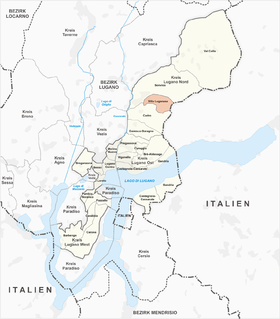
Villa Luganese is a quarter of the city of Lugano, Switzerland. Villa Luganese was formerly a municipality of its own, having been incorporated into Lugano in 2008.
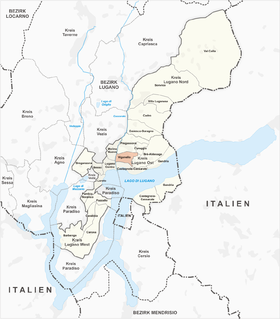
Viganello is a quarter of the city of Lugano, Switzerland. Viganello was formerly a municipality of its own, having been incorporated into Lugano in 2004. It was first recorded in 1300 as de Viganello.
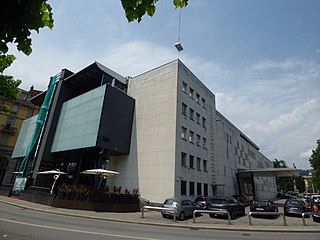
Casinò Lugano is a casino and theatre designed by Italian architect Achille Sfondrini in 1804. It is located in the city of Lugano, Switzerland. A restaurant and café called Elementi Ristorante is located within the building. The theatre was the host venue of the first Eurovision Song Contest in 1956.

Agra is a village and former municipality in the canton of Ticino, Switzerland.
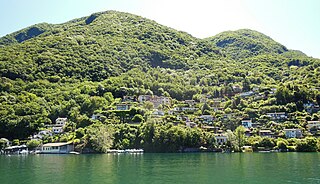
Caprino is a village on the southern shore of Lake Lugano in the Swiss canton of Ticino, to the east of the Italian exclave of Campione d'Italia and below the summit of Sighignola. Some 0.5 kilometres (0.31 mi) east of Caprino village is Cantine di Caprino, a smaller settlement. Politically both form part of the Castagnola-Cassarate quarter of the city of Lugano, although until 1972 Castagnola-Cassarate was an independent municipality under the name Castagnola.

Breganzona is a quarter of the city of Lugano, Switzerland. Breganzona was formerly a municipality of its own, having been incorporated into Lugano in 2004. It was first recorded in 984 as Brianzona. The municipality had 232 inhabitants in 1850, which increased to 369 in 1900, 883 in 1950, 4,654 in 1990 and 4,782 in 2000.

Cureggia is a quarter of the city of Lugano, Switzerland. Cureggia was formerly a municipality of its own, having been incorporated into Lugano in 2004. It was first recorded in 1329 as Curezia.

Davesco-Soragno is a quarter of the city of Lugano, Switzerland. Davesco-Soragno was formerly a municipality of its own, having been incorporated into Lugano in 2004.

Pazzallo is a quarter of the city of Lugano in the Swiss canton of Ticino. Pazzallo was formerly a municipality of its own, having been incorporated into Lugano in 2004.

Pambio Noranco is a quarter of the city of Lugano, Switzerland.

Kevin Romy is a Swiss former professional ice hockey centre who played in the National League (NL) for Genève-Servette HC and HC Lugano. Romy was drafted by the Philadelphia Flyers in the 4th round in the 2003 NHL Entry Draft. Romy also represented Switzerland at the 2014 Winter Olympics.

Besso is a quarter of the city of Lugano, in the Swiss canton of Ticino. It forms the part of the city which is uphill of Lugano railway station, and is separated from the city centre by that station and its rail approaches. Besso was developed as a residential area in the late nineteenth century, driven by the opening of the railway in 1882. By 2011, it had a population of 4,993.

Castagnola-Cassarate is a quarter of the city of Lugano, in the Swiss canton of Ticino. Until 1972, it was an independent municipality under the name Castagnola.
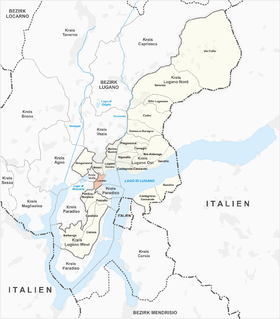
Loreto is a quarter of the city of Lugano, in the Swiss canton of Ticino. It forms the part of the city which surrounds the shrine of Our Lady of Loreto to the south of the city center, and includes the Lake Lugano waterfront south of the city centre but north of Paradiso. In 2011, it had a population of 3,221.

Molino Nuovo is a quarter of the city of Lugano, in the Swiss canton of Ticino. It lies to the north of the city center, and is the most populous quarter of the city. In 2012, it had a population of 9,258.






















